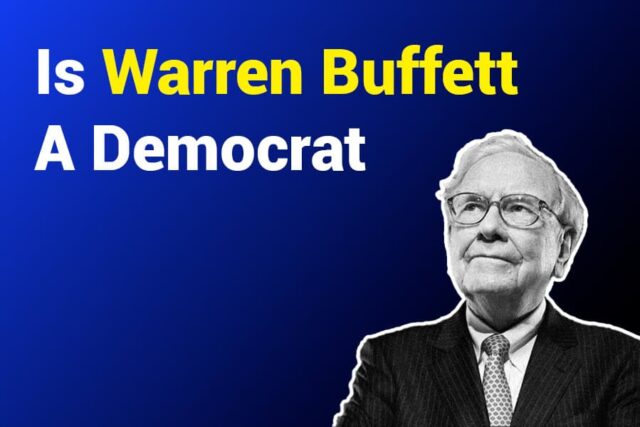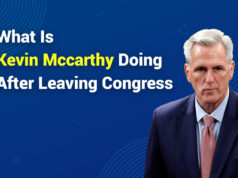Warren Buffett, famously known as the “Oracle of Omaha,” is a name that resonates in the worlds of finance, philanthropy, and public policy. While his investment strategies have made him one of the wealthiest individuals globally, his political leanings often spark curiosity. Is Warren Buffett a Democrat? This question frequently arises as Buffett’s public statements and philanthropic efforts reflect a deep concern for economic fairness and social responsibility.
Throughout his career, Buffett has championed policies advocating for progressive taxation and economic equity, aligning him with Democratic ideals. However, his pragmatic approach to politics often transcends party lines, making his stance both unique and influential. Whether endorsing specific candidates or speaking out on critical issues like healthcare and wealth distribution, Buffett’s voice carries weight in shaping public opinion and policy discussions.
In this blog post, we’ll explore Buffett’s political affiliations, dissect his statements and contributions, and delve into how his beliefs influence his actions on both a personal and professional level. Join us as we uncover whether Warren Buffett is truly a Democrat or if his ideology defies traditional political categorization.
Is Warren Buffett a Democrat?
Warren Buffett is widely considered a Democrat due to his consistent support for progressive policies and Democratic candidates. He has publicly advocated for higher taxes on the wealthy, a stance that aligns with Democratic values of economic equity. Over the years, Buffett has made significant contributions to Democratic campaigns and has voiced strong support for figures like Barack Obama and Hillary Clinton. However, his pragmatic approach often reflects bipartisan ideals, focusing on long-term economic sustainability rather than strict party loyalty.
Warren Buffett’s Political Affiliation
Buffett’s political leanings reflect his advocacy for progressive ideals, particularly on economic issues like taxation. A vocal proponent of higher taxes on the wealthy, Buffett has consistently championed the idea that those with substantial means should contribute more to society. This position aligns closely with the Democratic Party’s focus on reducing income inequality and promoting economic fairness.
Buffett’s backing of Democratic candidates further underscores his political affiliations. He has openly supported figures such as Barack Obama and Hillary Clinton, lauding their policies on healthcare, taxation, and economic reform. His financial contributions and public endorsements during their campaigns highlight his belief in their ability to enact meaningful change. However, Buffett’s approach to politics extends beyond partisanship; he is known for emphasizing pragmatism and long-term societal benefits.
Rather than adhering strictly to party ideology, Buffett evaluates policies and leaders based on their potential to address pressing societal challenges. His pragmatic perspective allows him to navigate complex political landscapes while maintaining a focus on practical solutions. For instance, while he often advocates for Democratic ideals, Buffett has also acknowledged the importance of bipartisan collaboration in addressing systemic issues like economic instability and climate change.
This blend of progressive advocacy and pragmatic decision-making has positioned Buffett as a distinctive voice in political discourse. His ability to balance ideological beliefs with a focus on tangible outcomes reflects his unique perspective on governance and leadership. Ultimately, understanding Warren Buffett as a Democrat provides valuable insights into how his political stance shapes his actions and contributions to public policy. As both a billionaire philanthropist and an influential political figure, Buffett’s views continue to resonate across the political spectrum.
Buffett’s Political Contributions and Endorsements
Financial Contributions to Democratic Campaigns
Warren Buffett has demonstrated his political preferences through substantial financial contributions to Democratic candidates and committees over the years. These donations highlight his commitment to supporting leaders who advocate for progressive policies, particularly on issues like taxation and healthcare reform. Buffett’s financial backing has played a crucial role in bolstering Democratic campaigns, providing the resources needed to advance their platforms and connect with voters.
Endorsements of Key Figures
Public endorsements from Buffett have further solidified his association with the Democratic Party. He has openly supported prominent leaders such as Barack Obama, Hillary Clinton, and Joe Biden, often citing their policies on progressive taxation and universal healthcare as key reasons for his backing. Buffett’s vocal support for these figures has not only contributed to their campaigns but also amplified the visibility of the policies he believes are essential for economic and social progress.
Advocacy for Progressive Policies
Buffett’s political actions extend beyond endorsements and contributions; he actively advocates for policies that align with Democratic principles. One of his most notable stances is his push for higher taxes on the wealthy, a position that underscores his belief in economic fairness and social responsibility. His public calls for reforms, such as the “Buffett Rule,” which proposes a minimum tax rate for high-income earners, reflect his commitment to addressing income inequality and promoting a balanced economic system.
Relationship with Republican Leaders
Despite his alignment with Democratic ideals, Buffett has maintained professional relationships with Republican leaders, showcasing his bipartisan approach to governance. His willingness to engage with individuals across the political spectrum highlights his pragmatism and focus on collaborative solutions. Buffett’s ability to navigate these relationships underscores his belief in the importance of bipartisan efforts to address complex societal challenges.
Impact of Contributions on Policy Debates
Buffett’s financial support and public advocacy have had a significant impact on policy debates surrounding wealth distribution and economic equity. By leveraging his platform and resources, he has influenced national conversations on these critical issues. His contributions have helped shape the narrative around taxation and economic reform, ensuring that these topics remain central to the political discourse.
Buffett’s Views on Economic Policies
Advocates for Progressive Taxation: Warren Buffett is a staunch advocate for progressive taxation, often criticizing tax policies that disproportionately benefit the ultra-wealthy. He has openly discussed how current tax breaks for billionaires and corporations exacerbate income inequality. His proposal for the “Buffett Rule,” which calls for a minimum tax rate for individuals earning over $1 million annually, highlights his commitment to a fairer tax system.
Supports Government Programs to Reduce Income Inequality: Buffett has consistently voiced support for government-led initiatives aimed at reducing income inequality and improving social welfare. Programs that address healthcare access, poverty alleviation, and job creation align with his belief in creating a more equitable society. His public statements often emphasize the moral and economic benefits of these programs, advocating for investments that uplift marginalized communities.
Believes in Balanced Capitalism: While Buffett is a champion of free-market principles, he also stresses the importance of corporate responsibility in maintaining a balanced capitalist system. He has frequently called for businesses to act ethically, prioritize long-term growth over short-term gains, and contribute to societal well-being. This perspective underscores his belief that capitalism can coexist with fairness and accountability.
Opposes Excessive Deregulation: Buffett has expressed concerns about excessive deregulation, warning that it could destabilize economic systems. He supports maintaining reasonable oversight of industries, particularly in finance and banking, to prevent crises similar to the 2008 financial meltdown. His stance reflects his belief that responsible regulation is necessary to ensure economic stability and protect consumers.
Emphasizes Long-Term Investments: A key pillar of Buffett’s economic philosophy is the emphasis on long-term investments in infrastructure and education. He argues that these investments not only drive economic growth but also create opportunities for future generations. By supporting policies that prioritize sustainable development and innovation, Buffett advocates for a forward-thinking approach to economic planning.
How Buffett’s Beliefs Influence His Actions?
Warren Buffett’s political philosophy is intricately tied to his economic beliefs and values. A prominent advocate for economic fairness, Buffett has consistently argued that the wealthy should contribute their fair share in taxes. His support for the “Buffett Rule,” which suggests a minimum tax rate for individuals earning over $1 million annually, exemplifies this stance. This proposal highlights his belief that a fairer tax system is essential to addressing income inequality and creating a more equitable society. This commitment to progressive taxation aligns closely with Democratic ideals and forms a cornerstone of his political perspective.
Buffett’s advocacy for economic reform extends beyond taxation and is reflected in his philanthropic initiatives. One of his most notable contributions is the Giving Pledge, a campaign he co-founded to encourage billionaires to donate a significant portion of their wealth to address pressing global challenges. This initiative underscores Buffett’s dedication to using his resources for the greater good, promoting societal progress through charitable giving and social responsibility.
However, the question is Warren Buffett a Democrat is not as straightforward as it may seem. While his values and actions often align with Democratic principles, Buffett’s approach to politics is not rigidly partisan. He has repeatedly emphasized the importance of bipartisan cooperation to solve systemic issues such as healthcare reform, economic instability, and climate change. His pragmatic perspective prioritizes meaningful progress over ideological divides, allowing him to work collaboratively with leaders from across the political spectrum.
Buffett’s actions demonstrate a unique balance between his Democratic leanings and his broader commitment to bridging political gaps. By focusing on solutions that benefit society as a whole, he has established himself as a pragmatic thinker whose influence extends beyond party lines. Understanding Warren Buffett a Democrat provides valuable insight into how his beliefs shape his actions, illustrating his dedication to fairness, collaboration, and impactful change.
Why Understanding Buffett’s Political Stance Matters
Influence on Public Policy
Warren Buffett’s influence on public policy is undeniable, as his statements and contributions have shaped critical debates surrounding taxation, economic equity, and corporate responsibility. His advocacy for higher taxes on the wealthy and a more equitable distribution of resources has sparked widespread discussions about income inequality and the role of government in addressing it. By using his platform to emphasize the importance of corporate accountability and long-term sustainability, Buffett has brought these issues to the forefront of political and economic discourse.
Role Model for Social Responsibility
As one of the wealthiest individuals in the world, Buffett’s commitment to fairness and philanthropy serves as a powerful example for other leaders. Through initiatives like the Giving Pledge, he has demonstrated how substantial wealth can be used to address global challenges and promote societal progress. His emphasis on ethical leadership and responsibility highlights the role influential figures can play in fostering a more just and balanced world. Buffett’s actions encourage others in positions of power to prioritize the greater good over personal gain, reinforcing the value of social responsibility.
Insights for Investors and Economists
Buffett’s political views offer unique insights into the intersection of finance and policy. His belief in progressive taxation, balanced capitalism, and corporate responsibility provides a framework for understanding how economic systems can be structured to benefit society as a whole. For investors and economists, Buffett’s perspectives serve as a guide to navigating complex financial landscapes while maintaining a focus on ethical practices and long-term sustainability. His pragmatic approach bridges the gap between profit-driven strategies and socially conscious decision-making.
Implications for Future Elections
Buffett’s public support for Democratic candidates has significant implications for future elections. His endorsements and financial contributions influence voter perceptions, amplifying the visibility of progressive policies and campaign platforms. By aligning himself with candidates who advocate for economic fairness and social equity, Buffett shapes the narrative surrounding key issues and impacts campaign strategies. His involvement in political discourse underscores the important role influential individuals play in shaping the direction of electoral outcomes and national priorities.
Final Word
Is Warren Buffett a Democrat? Warren Buffett is widely considered a Democrat due to his consistent support for progressive policies and Democratic candidates. Warren Buffett’s political identity is as multifaceted as his career. While his consistent support for Democratic candidates and progressive taxation policies suggests alignment with the Democratic Party, his pragmatic and bipartisan approach transcends strict political affiliations. Understanding Is Warren Buffett a Democrat offers deeper insights into how his beliefs shape public discourse and influence economic policies. Buffett’s commitment to fairness and philanthropy underscores his role as not just a financial leader but also a voice for social responsibility.
FAQ’s
Q. Is Warren Buffett officially a Democrat?
A. Warren Buffett has not formally declared a strict party affiliation but is widely considered a Democrat due to his support for progressive policies and Democratic candidates.
Q. What are Warren Buffett’s views on taxation?
A. Buffett advocates for higher taxes on the wealthy, believing that the ultra-rich should contribute more to address income inequality.
Q. Has Buffett supported Republican candidates?
A. While primarily associated with the Democratic Party, Buffett has maintained professional relationships with Republican leaders and occasionally praised bipartisan efforts.
Q. How does Buffett’s political stance affect his investments?
A. Buffett’s focus on long-term economic sustainability and corporate responsibility reflects his broader views on fairness and balanced capitalism.
Q. Why is Buffett’s political affiliation important?
A. Understanding Buffett’s political stance provides insights into his influence on public policy, philanthropy, and economic debates, making it a topic of interest for many.














